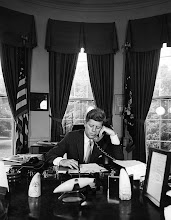Eavesdropping on JFK's telephone conversations and listening to his public addresses regarding civil rights was far more interesting than reading a dull, drawn-out textbook discussion of the same issue. Even so, I appreciated having a transcript so that I could follow the discussions more easily, especially when the president and Governor Barnett interrupted and tried to speak over each other. Although the recordings were very informative, I wish there had been a brief paragraph of background information on the topic so that I might familiarize myself with it before I began listening; unfortunately, it was not until I reached JFK's explanation in his public address that I fully understood the situation involving James Meredith and the University of Mississippi.
Overall, I was impressed by the way JFK intervened to ensure that the court orders were carried out in Mississippi to permit Meredith , an African American, to enroll in and reside at the University of Mississippi. I was equally impressed by JFK's delicacy, patience, and restraint in talking with Governor Barnett, whose attitudes toward race relations were obviously quite different from JFK's.
The podcast did leave me with several unanswered questions: Did Governor Barnett drive to the scene of the riot, and if so, what was the outcome of his appearance? Was the riot successfully repressed, or did violence continue in Mississippi? What happened to Meredith? Did they manage to transport him safely, or was he injured or even killed during the rioting? If he reached his destination unharmed, did he fall victim to violence later while attending the University of Mississippi?
Welcome APUSH'ers
Hello AP US History Students of the Summer 2014e,
Many of you are aware that something happened to the blog and posting was disabled. I only just was able to correct the problems with Google this weekend. I have a How to to help those who haven't posted anything, or just need to submit your final comment. Please do so as soon as you can. Deadlines will be extended to Tuesday, August 19th at 10 pm for all the Summer Blog deadlines.
You can access the Help Sheet by Clicking Here.
You need to post comments three different times for your Summer Reading.
Every time you post, you must include your first and last name-- every time you post (get the idea that your name is important?). Without a name, grades cannot be assigned. Keep in mind that we do not know you by name other than from the legal roster, please put any given names not used in parenthesis).
It is IMPORTANT that you use the username and password included in your Summer Reading packet. (username: mcapush2 password: historyrules)
Many of you are aware that something happened to the blog and posting was disabled. I only just was able to correct the problems with Google this weekend. I have a How to to help those who haven't posted anything, or just need to submit your final comment. Please do so as soon as you can. Deadlines will be extended to Tuesday, August 19th at 10 pm for all the Summer Blog deadlines.
You can access the Help Sheet by Clicking Here.
You need to post comments three different times for your Summer Reading.
Every time you post, you must include your first and last name-- every time you post (get the idea that your name is important?). Without a name, grades cannot be assigned. Keep in mind that we do not know you by name other than from the legal roster, please put any given names not used in parenthesis).
It is IMPORTANT that you use the username and password included in your Summer Reading packet. (username: mcapush2 password: historyrules)
Subscribe to:
Post Comments (Atom)




2 comments:
Jordan Webb- Kennedy over civil rights
John F. Kennedy was an iconic young diplomat who dealt with many crises in a short period of time. He was wise and refined in his speeches but very personal in his phones calls. As persuading as he is, he still had the south against him. At times in his phone calls to Barnett, it does not seem that JFK is aware of the full extent of racism in the south. JFK seemed like he did not want to cause problems or cause bloodshed by allowing James Meredith in to the University of Mississippi but by law he had to get him into the school. It impressed me how JFK followed this law even though the majority of the population was against it. Even though Barnett openly opposed the admission of Meredith into the university, JFK still took the time to listen to him, making JFK very honorable for listening to the other side. I don’t really believe that it was the best idea to not involve the army because the mobs and riots were going to come and he wasn’t prepared until after the matter was at hand. Also I thought the fact that he allowed everyone to listen to his phone calls, even personal ones showed what an honorable man he was. At times with the podcast I was sort of bored because I didn’t have a picture to follow or anything to keep my attention besides their voices, even though I enjoyed both the Northern and Southern accents.
Post a Comment